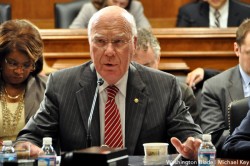National
BREAKING: Senate panel approves DOMA repeal legislation
Committee approves bill on 10-8 party-line vote

A Senate committee took historic action on Thursday against the Defense of Marriage Act by approving legislation that would lift the anti-gay law from the books.
The Senate Judiciary Committee reported the legislation to the floor by a vote of 10-8 along a party-line basis.
The committee vote marks the first-time ever that any component of Congress has voted to repeal DOMA, which prohibits federal recognition of same-sex marriage, since it was first enacted in 1996.
Committee Chair Patrick Leahy (D-Vt.) in his opening statement said legislation to repeal DOMA, which is known as the Respect for Marriage Act, is necessary because “thousands of American families are now being treated unfairly by their federal government.”
“They are shunted aside — singled out from all other marriages recognized by their states,” Leahy said. “This unfairness must end. The Respect for Marriage Act would provide for the equal treatment of all lawful treatment of all lawful marriages in this country by repealing DOMA.”
Sen. Dianne Feinstein (D-Calif.), the sponsor of the legislation, said she thinks DOMA is “discriminatory” and “should be stricken in its entirety from federal law.”
“Marriage is legal preserve of the states,” Feinstein said. “DOMA infringes on this state authority by requiring the federal government to disregard state law and deny more than 1,100 rights benefits to which all other legally married couples are entitled.”
Republicans said they oppose DOMA repeal because they believe it would undermine the definition of marriage as one man, one woman and impose same-sex marriage in states where it isn’t recognized. The GOP committee members also questioned why the panel was taking up the bill when passage of the floor is unlikely and the country is facing other matters such as jobs and the economy.
The Respect for Marriage Act wouldn’t require states to recognize marriage equality. However, the bill would enable federal benefits to continue to flow to same-sex couples if they marry in one jurisdiction and move to another state within the country that doesn’t recognize their union.
Sen. Charles Grassley (R-Iowa), ranking Republican on the committee, said the longstanding definition of marriage as between one man, one woman was one of the reasons he voted against the bill.
“For thousands of years, across all cultures and nations, marriage was exclusively a heterosexual institution,” Grassley said. “Obvious biological realities were a major reason why. Another reason was the universal religious view that marriage was about procreation and child-bearing.”
But Sen. Al Franken (D-Minn.) disputed the argument that marriage has been static for centuries and said Grassley “misstated” the history of the institution.
“Marriage has not existed as a union between one man and one woman for thousands of years in every culture,” Franken said. “In many cultures, men are able to marry many women, and even young girls. For centuries, women were treated as chattle in marriage.”
Franken continued, “Further, if the religious purpose of marriage is for procreation, why would we sanction marriage between an 80-year-old widower and a 80-year-old widow? I just think we need to be accurate when talk about … the history of our institutions.”
Grassley also disputed the notion that marriage is a civil rights issue, drawing a recent column from the New York Times’ Frank Bruni. Among the quotes from the column that Grassley selected was from Wade Henderson, president of the Leadership Conference on Civil and Human Rights, who was quoted as saying attempts to equate the persecution of gays and blacks is “deeply offensive.”
In a statement, Henderson said he in fact believes marriage is a civil right issue and Grassley mischaracterized his remarks before the committee.
“Sen. Charles Grassley chose to misappropriate and misconstrue statements attributed to me in a news article in order to make an illegitimate case against equality for LGBT Americans,” Henderson said. “He was wrong. Marriage equality is a civil rights issue and I am a supporter of marriage equality.”
LGBT advocates heralded the committee vote and called it one step toward ridding the books of an anti-gay law that has barred married same-sex couples from enjoying the federal benefits of marriage.
Rick Jacobs, chair of the Courage Campaign, said the panel vote marks a milestone in which the Senate for the first time “voted to make gays and lesbians whole people.”
“This truly historic vote today should never have been necessary because this absurd law should never have been on the books,” Jacobs said. “Thanks to Sen. Dianne Feinstein, we have a bill that can move to the Senate floor where fair-minded people who believe in a nation united, not divided, can end federal discrimination against gay and lesbian couples legally married in six states and the District of Columbia.”
Jacobs also criticized committee Republicans for voting in unison against the bill, saying, “Sadly, the Republicans think this is a partisan issue.”
Rea Carey, executive director of National Gay & Lesbian Task Force, was also among those praising the committee for moving forward with the Respect for Marriage Act.
This vote marks an important step toward recognizing our common humanity, and moves us closer to ending a grave injustice against thousands of loving, committed couples who simply want to provide and care for each other as other married couples are allowed to do,” Carey said. “It is shocking and an outrage that, in modern-day America, legally married same-sex couples are being singled out and selectively denied fundamental rights by their own federal government.”
The White House also praised the committee for moving forward DOMA repeal legislation. In July, President Obama endorsed the Respect for Marriage Act, although he previously campaigned on DOMA repeal in 2008.
“President Obama applauds today’s vote by the Senate Judiciary Committee to approve the Respect for Marriage Act, which would provide a legislative repeal of the so-called ‘Defense of Marriage Act,’ said Shin Inouye, a White House spokesperson.
Inouye continued, “The president has long believed that DOMA is discriminatory and has called for its repeal. We should all work towards taking this law off the books. The federal government should not deny gay and lesbian couples the same rights and legal protections afforded to straight couples.”
Whether the bill will come to a vote before the full Senate remains to be seen. In addition to Sen. Dianne Feinstein (D-Calif.), the bill’s sponsor, the bill only has 30 co-sponsors — far short of the 60 votes needed to overcome a Senate filibuster.
A Senate Judiciary Committee spokesperson deferred comment on scheduling to office of Senate Majority Leader Harry Reid (D-Nev.), which didn’t immediately respond to the Washington Blade’s request to comment on the bill.
Ranking Member Charles Grassley (R-Iowa) and Sen. John Cornyn (R-Texas) noted the difficulties of passing DOMA repeal on the Senate floor as a reason why the committee shouldn’t even have taken up the legislation. Cornyn said Democratic leaders would face a revolt in their own caucus if a vote was scheduled because of the political difficulties in passing the bill.
Asked by Cornyn during the markup whether a floor vote on DOMA would happen this Congress, Assistant Majority Leader Dick Durbin (D-Ill.) said he’s uncertain because of the Republicans’ extensive use of filibusters on the Senate floor.
But Durbin said “it would be worth it” to hold a floor vote on DOMA repeal even if the bill only received support from its 30 co-sponsors.
No amendments were offered during the markup to amend DOMA. The Washington Blade obtained three amendments that were set to come up during consideration of the bill, but no committee member introduced them. It’s unlikely Republicans had the votes to adopt any of the amendments as part of the legislation.
Among those in attendance during the Senate committee markup was Rep. Jerrold Nadler (D-N.Y.), the sponsor of the DOMA repeal legislation in the House.
Following the vote, Nadler told the Washington Blade the Senate markup was “another step forward” in moving toward DOMA repeal, but expressed pessimism about a similar vote in the Republican-controlled House.
“This is a subject that the more people get used to it, the better it is, the easier it makes it,” Nadler said. “I don’t believe the Republicans are going to allow a vote in the House anytime soon. We may have to wait for the next election for that, but this will help. It’ll definitely help.”
The White House
Four states to ignore new Title IX rules protecting transgender students
Biden administration last Friday released final regulations

BY ERIN REED | Last Friday, the Biden administration released its final Title IX rules, which include protections for LGBTQ students by clarifying that Title IX forbids discrimination based on sexual orientation and gender identity.
The rule change could have a significant impact as it would supersede bathroom bans and other discriminatory policies that have become increasingly common in Republican states within the U.S.
As of Thursday morning, however, officials in at least four states — Oklahoma, Louisiana, Florida, and South Carolina — have directed schools to ignore the regulations, potentially setting up a federal showdown that may ultimately end up in a protracted court battle in the lead-up to the 2024 elections.
Louisiana State Superintendent of Education Cade Brumley was the first to respond, decrying the fact that the new Title IX regulations could block teachers and other students from exercising what has been dubbed by some a “right to bully” transgender students by using their old names and pronouns intentionally.
Asserting that Title IX law does not protect trans and queer students, Brumley states that schools “should not alter policies or procedures at this time.” Critically, several courts have ruled that trans and queer students are protected by Title IX, including the 4th U.S. Circuit Court of Appeals in a recent case in West Virginia.
In South Carolina, Schools Supt. Ellen Weaver wrote in a letter that providing protections for trans and LGBTQ students under Title IX “would rescind 50 years of progress and equality of opportunity by putting girls and women at a disadvantage in the educational arena,” apparently leaving trans kids out of her definition of those who deserve progress and equality of opportunity.
She then directed schools to ignore the new directive while waiting for court challenges. While South Carolina does not have a bathroom ban or statewide “Don’t Say Gay or Trans” law, such bills continue to be proposed in the state.
Responding to the South Carolina letter, Chase Glenn of Alliance For Full Acceptance stated, “While Supt. Weaver may not personally support the rights of LGBTQ+ students, she has the responsibility as the top school leader in our state to ensure that all students have equal rights and protections, and a safe place to learn and be themselves. The flagrant disregard shown for the Title IX rule tells me that our superintendent unfortunately does not have the best interests of all students in mind.”
Florida Education Commissioner Manny Diaz also joined in instructing schools not to implement Title IX regulations. In a letter issued to area schools, Diaz stated that the new Title IX regulations were tantamount to “gaslighting the country into believing that biological sex no longer has any meaning.”
Governor Ron DeSantis approved of the letter and stated that Florida “will not comply.” Florida has notably been the site of some of the most viciously anti-queer and anti-trans legislation in recent history, including a “Don’t Say Gay or Trans” law that was used to force a trans female teacher to go by “Mr.”
State Education Supt. Ryan Walters of Oklahoma was the latest to echo similar sentiments. Walters has recently appointed the right-wing media figure Chaya Raichik of Libs of TikTok to an advisory role “to improve school safety,” and notably, Raichik has posed proudly with papers accusing her of instigating bomb threats with her incendiary posts about LGBTQ people in classrooms.
The Title IX policies have been universally applauded by large LGBTQ rights organizations in the U.S. Lambda Legal, a key figure in fighting anti-LGBTQ legislation nationwide, said that the regulations “clearly cover LGBTQ+ students, as well as survivors and pregnant and parenting students across race and gender identity.” The Human Rights Campaign also praised the rule, stating, “rule will be life-changing for so many LGBTQ+ youth and help ensure LGBTQ+ students can receive the same educational experience as their peers: Going to dances, safely using the restroom, and writing stories that tell the truth about their own lives.”
The rule is slated to go into effect Aug. 1, pending any legal challenges.
****************************************************************************

Erin Reed is a transgender woman (she/her pronouns) and researcher who tracks anti-LGBTQ+ legislation around the world and helps people become better advocates for their queer family, friends, colleagues, and community. Reed also is a social media consultant and public speaker.
******************************************************************************************
The preceding article was first published at Erin In The Morning and is republished with permission.
Pennsylvania
Malcolm Kenyatta could become the first LGBTQ statewide elected official in Pa.
State lawmaker a prominent Biden-Harris 2024 reelection campaign surrogate

Following his win in the Democratic primary contest on Wednesday, Pennsylvania state Rep. Malcolm Kenyatta, who is running for auditor general, is positioned to potentially become the first openly LGBTQ elected official serving the commonwealth.
In a statement celebrating his victory, LGBTQ+ Victory Fund President Annise Parker said, “Pennsylvanians trust Malcolm Kenyatta to be their watchdog as auditor general because that’s exactly what he’s been as a legislator.”
“LGBTQ+ Victory Fund is all in for Malcolm, because we know he has the experience to win this race and carry on his fight for students, seniors and workers as Pennsylvania’s auditor general,” she said.
Parker added, “LGBTQ+ Americans are severely underrepresented in public office and the numbers are even worse for Black LGBTQ+ representation. I look forward to doing everything I can to mobilize LGBTQ+ Pennsylvanians and our allies to get out and vote for Malcolm this November so we can make history.”
In April 2023, Kenyatta was appointed by the White House to serve as director of the Presidential Advisory Commission on Advancing Educational Equity, Excellence and Economic Opportunity for Black Americans.
He has been an active surrogate in the Biden-Harris 2024 reelection campaign.
The White House
White House debuts action plan targeting pollutants in drinking water
Same-sex couples face higher risk from environmental hazards

Headlining an Earth Day event in Northern Virginia’s Prince William Forest on Monday, President Joe Biden announced the disbursement of $7 billion in new grants for solar projects and warned of his Republican opponent’s plans to roll back the progress his administration has made toward addressing the harms of climate change.
The administration has led more than 500 programs geared toward communities most impacted by health and safety hazards like pollution and extreme weather events.
In a statement to the Washington Blade on Wednesday, Brenda Mallory, chair of the White House Council on Environmental Quality, said, “President Biden is leading the most ambitious climate, conservation, and environmental justice agenda in history — and that means working toward a future where all people can breathe clean air, drink clean water, and live in a healthy community.”
“This Earth Week, the Biden-Harris Administration announced $7 billion in solar energy projects for over 900,000 households in disadvantaged communities while creating hundreds of thousands of clean energy jobs, which are being made more accessible by the American Climate Corps,” she said. “President Biden is delivering on his promise to help protect all communities from the impacts of climate change — including the LGBTQI+ community — and that we leave no community behind as we build an equitable and inclusive clean energy economy for all.”
Recent milestones in the administration’s climate policies include the U.S. Environmental Protection Agency’s issuance on April 10 of legally enforceable standard for detecting and treating drinking water contaminated with polyfluoroalkyl substances.
“This rule sets health safeguards and will require public water systems to monitor and reduce the levels of PFAS in our nation’s drinking water, and notify the public of any exceedances of those levels,” according to a White House fact sheet. “The rule sets drinking water limits for five individual PFAS, including the most frequently found PFOA and PFOS.”
The move is expected to protect 100 million Americans from exposure to the “forever chemicals,” which have been linked to severe health problems including cancers, liver and heart damage, and developmental impacts in children.
An interactive dashboard from the United States Geological Survey shows the concentrations of polyfluoroalkyl substances in tapwater are highest in urban areas with dense populations, including cities like New York and Los Angeles.
During Biden’s tenure, the federal government has launched more than 500 programs that are geared toward investing in the communities most impacted by climate change, whether the harms may arise from chemical pollutants, extreme weather events, or other causes.
New research by the Williams Institute at the UCLA School of Law found that because LGBTQ Americans are likelier to live in coastal areas and densely populated cities, households with same-sex couples are likelier to experience the adverse effects of climate change.
The report notes that previous research, including a study that used “national Census data on same-sex households by census tract combined with data on hazardous air pollutants (HAPs) from the National Air Toxics Assessment” to model “the relationship between same-sex households and risk of cancer and respiratory illness” found “that higher prevalence of same-sex households is associated with higher risks for these diseases.”
“Climate change action plans at federal, state, and local levels, including disaster preparedness, response, and recovery plans, must be inclusive and address the specific needs and vulnerabilities facing LGBT people,” the Williams Institute wrote.
With respect to polyfluoroalkyl substances, the EPA’s adoption of new standards follows other federal actions undertaken during the Biden-Harris administration to protect firefighters and healthcare workers, test for and clean up pollution, and phase out or reduce use of the chemicals in fire suppressants, food packaging, and federal procurement.
-

 District of Columbia3 days ago
District of Columbia3 days agoCatching up with the asexuals and aromantics of D.C.
-

 South America3 days ago
South America3 days agoArgentina government dismisses transgender public sector employees
-

 Maine4 days ago
Maine4 days agoMaine governor signs transgender, abortion sanctuary bill into law
-

 District of Columbia4 days ago
District of Columbia4 days agoBowser budget proposal calls for $5.25 million for 2025 World Pride













